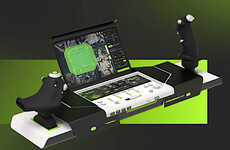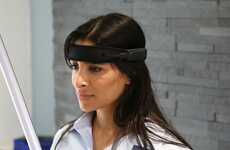
This Technology Will Allow People to Pilot Aircraft Using Their Brainwaves
Rahul Kalvapalle — February 25, 2015 — Tech
References: tekevernews.blogspot & bbc
Brainflight is a project that is bidding to pull the concept of brain-controlled drones out of the science fiction realm and bring it into reality. The project is the result of a collaboration between four organizations, and is developing drones that can be directly controlled by the human brain.
These drones are the result of technology that brings together cutting-edge neuroscience research with the latest in aeronautical engineering. The project itself explores two separate brain-computer interface approaches. Recently, the researchers carried out a demonstration in Portugal in which a person wearing an EEG (electroencephalography) device was able to pilot a small aircraft.
In the long term, brain-controlled drones could reduce the workload of pilots and allow them to focus on more complicated tasks, or could be used to help the physically disabled pilot aircraft.
These drones are the result of technology that brings together cutting-edge neuroscience research with the latest in aeronautical engineering. The project itself explores two separate brain-computer interface approaches. Recently, the researchers carried out a demonstration in Portugal in which a person wearing an EEG (electroencephalography) device was able to pilot a small aircraft.
In the long term, brain-controlled drones could reduce the workload of pilots and allow them to focus on more complicated tasks, or could be used to help the physically disabled pilot aircraft.
Trend Themes
1. Brain-controlled Drones - Disruptive innovation opportunity: Brain-controlled drones can revolutionize the aviation industry by reducing pilot workload and enabling physically disabled individuals to pilot aircraft.
2. Neuroscience Research - Disruptive innovation opportunity: Advancements in neuroscience research can lead to breakthroughs in brain-computer interface technology, opening up new possibilities for controlling various devices.
3. Aeronautical Engineering - Disruptive innovation opportunity: Advancements in aeronautical engineering can enhance the development of brain-controlled drones, making them more efficient, reliable, and accessible.
Industry Implications
1. Aviation - Disruptive innovation opportunity: The aviation industry can benefit from brain-controlled drones to improve pilot efficiency, safety, and accessibility.
2. Healthcare - Disruptive innovation opportunity: The healthcare industry can explore brain-computer interface technology for assisting physically disabled individuals with piloting aircraft or operating other medical devices.
3. Technology - Disruptive innovation opportunity: The technology industry can push the boundaries of brain-controlled drones and brain-computer interfaces, leading to new applications in various sectors.
0.9
Score
Popularity
Activity
Freshness























